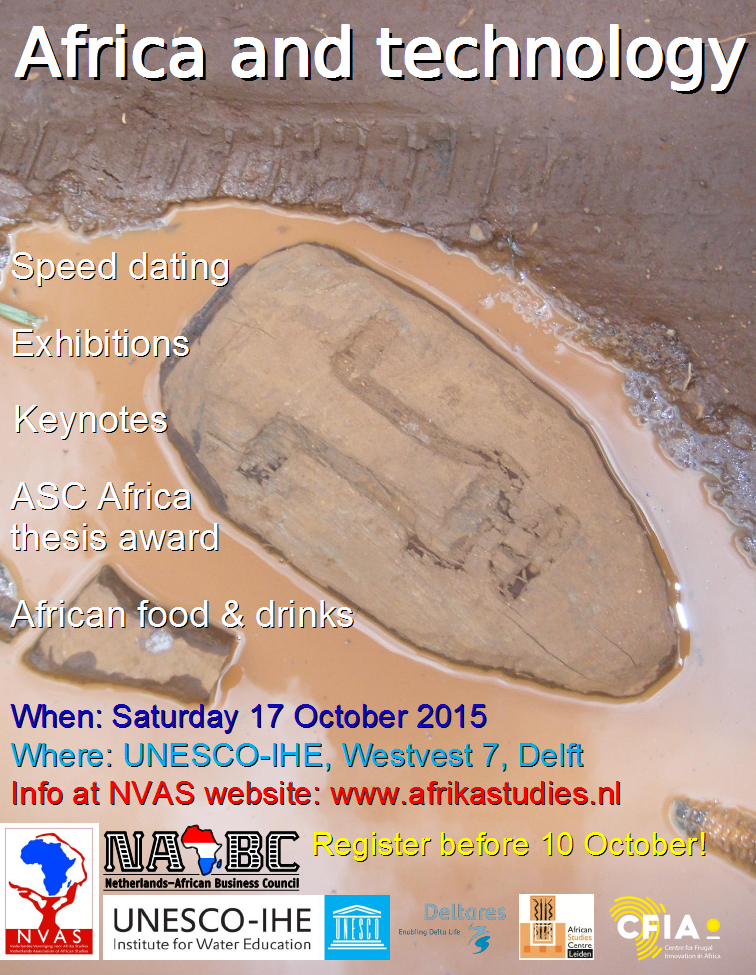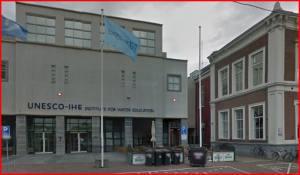WHERE: UNESCO-IHE Institute for Water Education, Westvest 7, Delft
REGISTRATION: to register please send an e-mail to winden@ascleiden.nl .
The registration fees are €15 for students and NVAS members, €25 for others. The fee includes a wonderful programme, an African themed lunch, heated discussions, drinks and snacks.
 What do we know about technology in Africa? Which technologies are being studied, by whom and from what perspective? Which technologies are being developed to make life better in Africa, i.e. easier, safer, or healthier? How intrusive has western technology been? On 17 October 2015 the Netherlands Association of African Studies (NVAS) organizes its NVAS Africa Day to provide a platform for the presentation and discussion of research on technologies that are present in Africa or are aimed at improving life in Africa.
What do we know about technology in Africa? Which technologies are being studied, by whom and from what perspective? Which technologies are being developed to make life better in Africa, i.e. easier, safer, or healthier? How intrusive has western technology been? On 17 October 2015 the Netherlands Association of African Studies (NVAS) organizes its NVAS Africa Day to provide a platform for the presentation and discussion of research on technologies that are present in Africa or are aimed at improving life in Africa.
Organizers are Pieter van der Zaag and Martin Mulanga (UNESCO-IHE), Anneke Breedveld (breedvelda@yahoo.co.uk) (NVAS), Tom Harmsen and Iva Pesa (i.pesa@ascleiden.nl) (CFIA). The programme is promising!
PROGRAMME NVAS AFRICA DAY 2015
To download the programme please click on the underlined link.
For additional remarks on the programme see following points: 1-2
1. Speed dating current research: questions to be discussed
Expert researchers present their current research by means of two questions or statements. You can attend four sessions. Feel free to switch rooms between the sessions.
Round 1: A = 11:55-12:10; B = 12:10-12:25
Katrien Pype [Technology cultures] Room A1B
- An anthropological analysis of technology cultures in postcolonial African urban spaces
allows us to contest the ethnocentric assumptions of the notion of “smart cities”. - Blacksmiths, frauds, healers, engineers, IT’ers, musicians, and elderly people constitute the heterogeneous group of technology experts in contemporary Kinshasa.
Sjaak van der Geest [Medical anthropology] Room A2
- How medical is the medical technology of basic sanitation?
- How has this technology affected life in African communities?
Roos Keja [Mobile phones and development] Room A3
- The mobile phone is heavily overrated as ‘tool for development’ in Africa.
- Are African countries with a (former) repressive regime a good or a bad place to start a citizen-based SMS-monitoring and evaluation system?
Tessa Pijnaker [Game developers] Room A4
- Game developers are dependent on neoliberal development programs to become successful.
- Game developers actively use neoliberal development programs to recreate local visions on what it means to be accomplished.
Fiona Dragstra [ICT and political change] Room A5
- Do new ICTs revolutionize political participation, mobilization and engagement in Africa?
- How have new ICTs influenced Burkina Faso’s path towards political change in the past year?
Round 2: C = 14:30-14:45; D = 14:45-15:00
Victor Langenberg (Deltares), Martin van der Knaap (UNOPS) [Food safety in Africa -fishery] Room A1B
- Implementing new techniques in Africa? Use vernacular approaches.
- Want to become successful with Africa? Consider not one but four returns of investment by using panarchistic business models.
Paul van Beers [Sustainable water pump] Room A2
- What is a possible solution for especially poor people paying too much for water?
- Is development aid the main reason that the water price in Africa is too high?
Iva Pesa [Frugal innovation] Room A3
- What distinguishes frugal innovation from other types of innovation and technology
networks in Africa? - Can frugal innovation stimulate local economic development in African countries?
Otto Kroesen [Farmers and technology] Room A4
- How can the capacities of low educated traditional smallholder farmers be trained?
- How can technology be designed to serve these purposes?
Hilje van der Horst [Improved cook stoves] Room A5
- Despite having lower long term benefits, improved stoves have higher acceptance rates than solar cookers. This is due to the improved stoves being an incremental improvement upon conventional woodstoves, while solar cookers are considered as ‘new’.
- In order for solar cooker acceptance to increase, we should understand how the solar cooker can be better embedded in existing practices of cooking, selling and gender relations. This will help to reframe the technology as an incremental change.
2. Exhibitions
- Jan Carel Diehl and Ana Laura Santos – Frugal thermometer
- Ellen van Andel and Nadine Rodewijk – Trans African Hydro Meteorological Observatory
- Helena Hansson – Design (of ropes and baskets) for frugal innovation, a mediator approach
- Dick van Gameren – Affordable housing
- Rokus Osma a.o. (Oskam VF) – Compressed earth block machine
- Wilma Goppel, Piet Sluimer (KoZon) – Solar cooking
- Hans Simons (Kascade) en Victor Langeberg (Deltares) – Fish drying machine
- Bart Bleijerveld – Polymore plastic recycling
- Nyefene Martin Kwabene – Gbare as alternative source of charcoal for cooking
- Sared Schram (Waka Waka) – Lighting solutions
- Christina Mansson (Multiverse) – A trailer of the film on Ghanaian scientists and intellectuals by Juul van der Laan
- Niels Hazekamp (Closing the Loop) – During the lunch several interactive sessions will be held on what’s inside your cell phone and how this is related to urban mining
- Aafke Mak – Netherlands Africa Business Council
- Karin van der Weerd – VIA water
- Paul van Beers – Blue pump, fair water
- Yosief Iyassu – Cooking stoves and carbon finance proposals in Eritrea
- And more…
LOCATION
UNESCO-IHE is very close to Delft’s central train station. Just exit the station on the “Centrum” side, turn left and walk for approx. 2 minutes before you reach the UNESCO-IHE building on Westvest 7. Telephone: + 31 (0)152151715

